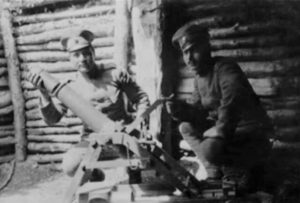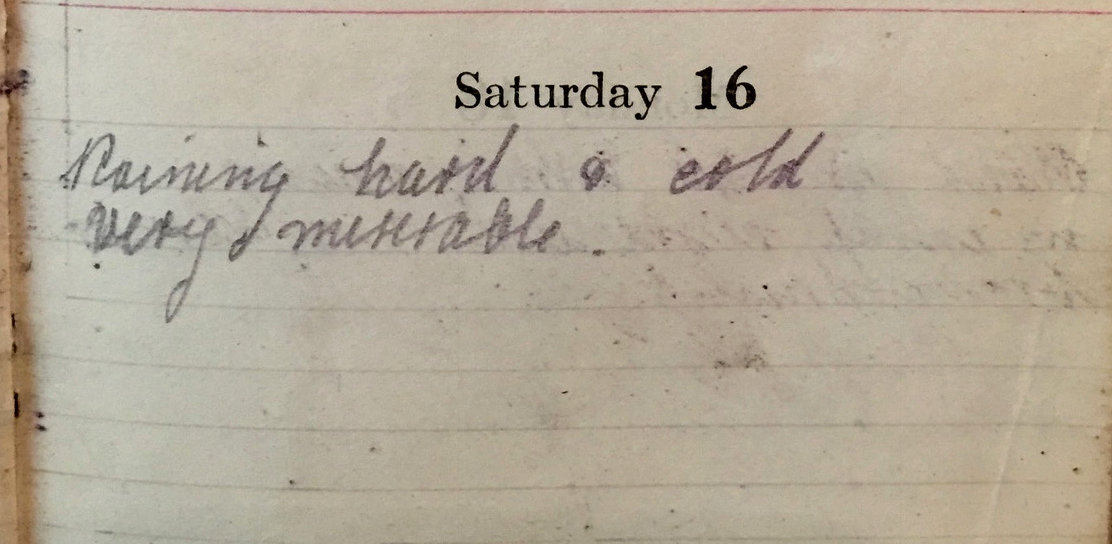Saturday February 16th, 1918
Raining hard and cold. Very miserable.
Raiding Party
Frank seems very fed up today. By contrast, the Battalion diary reports a raiding party, sent to investigate the ruined house. See sketch in yesterday’s post for its location. Raiding parties were routinely sent out into no-man’s land to look for signs of enemy activity and, ideally, capture prisoners who can then be interrogated.
G Ward Price explains the process, ‘There are hills and ravines and woods and ruined villages, the last of which are usually the goals of our patrolling parties, as the enemy outposts sometimes occupy them at night. It is an eerie business moving … in single file, with all the stealth of burglars crossing a wired lawn (for the same reasons too, since the Bulgars occasionally lay trip-wires for our men to ring a bell or detonate a bomb, so that they, lying up at close range, can get a sitting shot).’¹
In tonight’s raid the enemy’s barbed wire defence is thick and takes some time to cut through. No one is in the house and the lack of cover means that it is too dangerous to leave a look-out. Why they bring back a piece of wood and a stone is anyone’s guess – do the souvenirs just proves they were there?
Perhaps even the fact that this raid was documented in the diary, proves correct these assertions of G. Ward Price: ‘The night patrolling, which makes up so much of the day-to-day work of the troops in the front line in the Balkans, is entered into with zest. In fact, I have heard an officer whisper, when out with a night-patrol, as the severest threat he could use to a man, “If you can’t make less noise than that, Brown, I won’t bring you out again.” This night hunting appeals to the sporting instincts of the men, and it is wonderful training for young officers.‘¹
Enemy Shells

Both diaries note that it is an awful day – lots of rain and overcast. Poor visibility hampered the British artillery today and all it can do is ‘register’. ‘Registration is when gun seeks out a target before an operation. The range and direction are noted so that the target can be re-found quickly when the attack takes place.’²
The weather did not stop the Bulgars who fired trench mortars onto the front lines to the west of Wylye Camp.
Trench mortars were popular with the Bulgarians who had deployed 380 of them by the end of the war. They created both dedicated trench mortar battalions and, within the infantry, light trench mortar companies.³ The photograph shows two Bulgarian soldiers with a German-manufactured trench mortar ‘9 cm Minenwerfer System Lanz’. It was manufactured in Mannheim by Heinrich Lanz. The barrel was made of sheet steel for the 91.3 mm calibre and was mounted of a folding sled, fixed onto a wooden plate with iron reinforcements. The 9th Plevenska Infantry Division had 10 MW Lanz in 1917 at Dojran.*
13th (Service) Battalion War Diary – 16th February 1918 – No 1 Sector, Minden Camp
Raid: 2Lt HG Hodges and 13 OR raided the ruined house at pt 12675-18435 (South of Dojran Town). The patrol left our barricade on Dojran Road at 00:40 hrs. A gap was cut through the orchard West of road allowing patrol to proceed to North West corner of the orchard. 3 OR then proceeded to cut a gap in the enemy belt of wire, which was found to be very thick and difficult to cut. ‘Very lights’ and rifle shots were fired from O1. The gap was made by 02:45 hours. The assaulting party then moved forward. 4 OR worked to the back and East of the house. No signed of enemy were seen. The Officer and 5 OR searched the house but found no sign of occupation; rafters and bricks lying about inside. On the North West side of the house there is an opening two feed wide and 3 feet from the ground. After a thorough search of the house and vicinity, the party withdrew bringing back a piece of wood and a stone from the inside of the house. No men were left at the home to watch for the enemy as there was no shelter or cover from view.
The day was very wet and overcast. Observation was very difficult. Except for registration our artillery was inactive. Enemy artillery inactive. Enemy fired six Trench Mortar shells on B4 & B8 between 21:35 and 23:25 hrs. The gap cut by the raiding party has not been repaired. The transfer of 1 OR from the Labour Corps mentioned on the 13-2-18 is cancelled. 1 OR is compulsorily transferred from Corps of Military Police with effect from 28-1-18, 1 OR as above from RAMC with effect from 12-2-18. 1 OR is compulsorily transferred to the RE under AD 204 of 1916 from 6-2-18.
References & Further Reading
1 ‘The Story of the Salonica Army’ 1915-1917. Written mid-1917 as a memoir on Salonika by G. Ward Price. He was an American war correspondents whose accounts often appeared in British newspapers.
² Charlie from The Manchesters
³
* Lanz 9cm MW on Bulgarian Artillery


